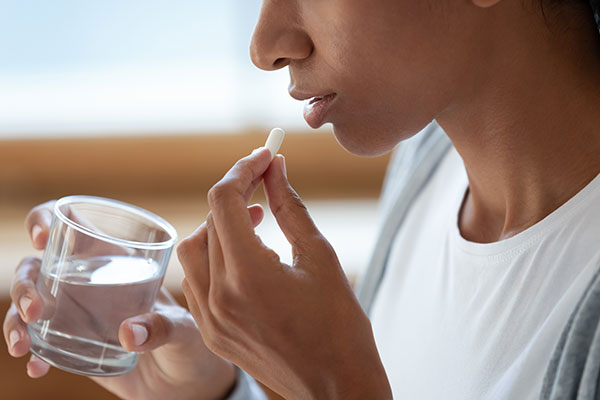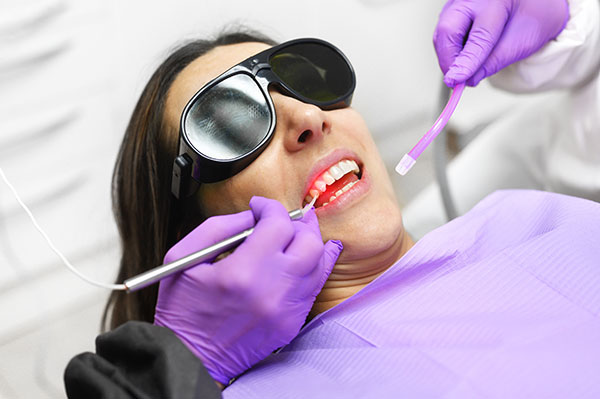Antibiotic Therapy
Antibiotic Therapy: A Powerful Tool in the Fight Against Oral Infections
Gum disease is a common oral health issue caused by a buildup of bacteria in the mouth, leading to inflammation, bleeding, and eventually tooth loss if left untreated. One of the most effective ways to combat gum disease is by using antibiotics.
While antibiotics aren’t always necessary, our Jupiter dentist breaks down the use of them in the fight against gum disease and when they may be recommended. If you have gum disease and need treatment, contact our dental office today by calling (561) 744-0677.
What Is Antibiotic Therapy?
Antibiotic therapy is a type of treatment approach that uses medications to specifically target and eliminate harmful bacteria that contribute to gum disease. When used in combination with traditional non-surgical treatments like scaling and root planing, antibiotics can help reduce inflammation, improve oral hygiene, and prevent further damage to the gum tissues and bone supporting the teeth.
Antibiotics can be prescribed as a pill, a mouthwash, or as an injection into the affected area. It’s important to follow the prescribed dosage and complete the full course of treatment to ensure maximum effectiveness and reduce the risk of antibiotic resistance. By working with your dentist and following a tailored treatment plan, antibiotic therapy can be a powerful tool in the fight against gum disease.
Types of Antibiotics
Several types of antibiotics may be prescribed to treat gum disease, including:
- Tetracyclines: Tetracyclines are a group of antibiotics that are often used to treat gum disease. They work by inhibiting the growth of bacteria and reducing inflammation. Tetracyclines may be taken orally or applied topically.
- Macrolides: Macrolides are another group of antibiotics that may be used to treat gum disease. They work by preventing the bacteria from producing proteins needed for growth and reproduction. Macrolides are typically taken orally.
- Penicillins: Penicillins are a class of antibiotics that can be effective against the bacteria that cause gum disease. They work by inhibiting the bacteria’s ability to form a cell wall, which can lead to the bacteria’s death. Penicillins may be taken orally or injected.

Benefits of Antibiotic Therapy
Antibiotic therapy provides many benefits, including:
- Cures the infection and alleviates symptoms.
- Prevents the infection from spreading to other areas of the body. This is particularly important in dental infections, as they can spread to the jawbone or even the bloodstream if left untreated.
- Safe and easy to administer.
- Very few side effects for most patients.
- Enhances the effectiveness of other treatments.
- Prevents recurrence as it reduces the number of bacteria that cause gum disease.
How Antibiotic Treatment Works
Antibiotic therapy works by targeting the bacteria causing the infection. When you take antibiotics, they’re absorbed into your bloodstream and travel to the site of the infection. Once there, they work to either kill the bacteria or slow their growth. This allows your immune system to fight the infection more effectively.
However, not all bacterial infections require antibiotics. In some cases, your immune system can fight off the infection on its own. Dr. Al Villalobos in Jupiter will evaluate your condition and determine whether or not antibiotic therapy is necessary.
Antibiotic Alternatives
Antibiotics aren’t the only option for gum disease treatment. Several alternatives that may be recommended include:
- Herbal remedies: Some herbs, such as tea tree oil or echinacea, have antibacterial properties that can assist in fighting off the bacteria that cause gum disease. They may be used in the form of mouthwash, supplements, or topical treatments.
- Probiotics: These are beneficial bacteria that can help balance the oral microbiome and prevent harmful bacteria from proliferating. They can be taken as supplements or consumed in fermented foods, like yogurt.
- Laser Therapy: A non-invasive treatment that uses special dental lasers to remove plaque and bacteria from the gum line.

Costs of Antibiotics
The costs of antibiotic therapy for gum disease treatment can vary depending on various factors, including the specific antibiotics prescribed, the duration of treatment, the severity of the gum disease, the geographic location, and the dental provider’s fees. In general, antibiotics are often prescribed as an adjunctive therapy alongside non-surgical gum disease treatments such as scaling and root planing (deep cleaning) or periodontal surgery.
The cost of the antibiotics themselves can range from relatively inexpensive generic versions to more expensive brand-name medications. Not all cases of gum disease require antibiotic therapy, and the decision to prescribe antibiotics should be made by a qualified dental professional based on a thorough examination and diagnosis.
To get an accurate estimate of the costs involved in antibiotic therapy for gum disease treatment, it’s best to consult with your dentist or periodontist who can evaluate your specific condition and provide you with a detailed treatment plan and cost breakdown. Dental insurance coverage may also influence the out-of-pocket expenses associated with gum disease treatment, so it’s important to check with your insurance provider to understand the extent of coverage for antibiotics and related treatments.
Frequently Asked Questions
How long does it take for antibiotics to work in treating gum disease?
The time it takes for antibiotics to work in treating gum disease varies depending on the severity of the infection and the type of antibiotic used. However, in most cases, patients can expect to see improvement in their gum disease symptoms within a few days to a week of starting antibiotics. It’s important to follow the full course of treatment prescribed by your dentist or healthcare provider, even if symptoms improve quickly.
What are the common side effects of antibiotics used in gum disease treatment?
Common side effects of antibiotics used in gum disease treatment may include upset stomach, diarrhea, and yeast infections. Some antibiotics may also cause allergic reactions, such as hives or difficulty breathing. It’s important to discuss any concerns about side effects with your dentist or healthcare provider before starting treatment.
Can antibiotics be used as the sole treatment for gum disease, or do they need to be combined with other therapies?
Antibiotics are often used in combination with other therapies, such as deep cleaning procedures like scaling and root planing, to treat gum disease. While antibiotics can be effective in reducing the bacterial infection that causes gum disease, they may not address other underlying factors contributing to the condition, such as poor oral hygiene or smoking.
Are there any risks or complications associated with the long-term use of antibiotics to treat gum disease?
Long-term use of antibiotics to treat gum disease can increase the risk of developing antibiotic resistance, which can make future infections more difficult to treat. It’s important to use antibiotics only when necessary and as directed by your dentist or healthcare provider. Your dentist may also recommend periodic assessments to monitor your gum disease and adjust your treatment plan as needed.
Take Control of Your Oral Health With Antibiotic Therapy for Gum Disease
Antibiotics can help quickly and effectively reduce the bacterial infection that causes gum disease, leading to improved oral health and overall well-being. Don’t let the fear of potential side effects or concerns about long-term use prevent you from taking action to improve your oral health. With the right guidance and support from a dental professional like myself, you can enjoy a healthy, happy smile for years to come.
Contact our Jupiter dental office today to learn more about the benefits of antibiotic therapy and other effective treatments for gum disease. Call (561) 744-0677 to schedule your appointment and take the first step toward a healthier smile!
